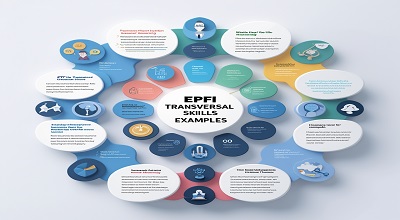EPFI Transversal Skills
EPFI Transversal skills, also known as transferable or soft skills, are essential competencies that transcend specific job roles, industries, or academic disciplines. These skills are increasingly recognized as critical for personal and professional success in a rapidly evolving world. In this article, we will explore the concept of EPFI transversal skills, their importance, and practical examples to help you understand and develop them effectively.
What Are EPFI Transversal Skills?
EPFI transversal skills refer to a specific framework of transferable skills that are categorized into four key domains: Emotional, Personal, Functional, and Interpersonal. These domains encompass a wide range of abilities that are applicable across various contexts, making them invaluable in both professional and personal settings.
1. Emotional Skills
Emotional skills involve the ability to understand, manage, and express emotions effectively. These skills are crucial for maintaining mental well-being and fostering positive relationships.
Examples:
- Emotional Intelligence (EQ): The ability to recognize and regulate your emotions while empathizing with others.
- Stress Management: Techniques to handle stress effectively, such as mindfulness or time management.
- Resilience: The capacity to bounce back from setbacks and adapt to challenges.
2. Personal Skills
Personal skills are self-management abilities that enable individuals to take control of their own development and behavior.
Examples:
- Self-Motivation: The drive to achieve goals without external pressure.
- Adaptability: The ability to adjust to new environments or changes in circumstances.
- Critical Thinking: Analyzing situations logically to make informed decisions.
3. Functional Skills
Functional skills are practical abilities that are directly applicable to tasks and responsibilities in various settings.
Examples:
- Problem-Solving: Identifying issues and implementing effective solutions.
- Time Management: Organizing and prioritizing tasks to meet deadlines.
- Digital Literacy: Proficiency in using technology and digital tools.
4. Interpersonal Skills
Interpersonal skills involve the ability to interact effectively with others, fostering collaboration and communication.
Examples:
- Teamwork: Working collaboratively with others to achieve common goals.
- Conflict Resolution: Addressing and resolving disagreements constructively.
- Communication: Conveying ideas clearly and listening actively.
Why Are EPFI Transversal Skills Important?
EPFI transversal skills are vital for several reasons:
- Versatility: These skills are applicable across various industries and roles, making them highly valuable in a dynamic job market 1.
- Employability: Employers increasingly prioritize transversal skills, as they indicate a candidate’s ability to adapt and thrive in diverse environments.
- Personal Growth: Developing these skills enhances self-awareness, emotional intelligence, and overall well-being.
How to Develop EPFI Transversal Skills?
1. Emotional Skills Development
- Practice mindfulness and meditation to improve emotional regulation.
- Seek feedback from peers to enhance self-awareness.
- Engage in activities that challenge your emotional resilience, such as public speaking or volunteering.
2. Personal Skills Development
- Set SMART (Specific, Measurable, Achievable, Relevant, Time-bound) goals to boost self-motivation.
- Embrace lifelong learning by taking courses or attending workshops.
- Reflect on past experiences to identify areas for improvement.
3. Functional Skills Development
- Use productivity tools like calendars and task managers to improve time management.
- Solve puzzles or engage in brainstorming sessions to enhance problem-solving abilities.
- Stay updated with the latest technology trends to improve digital literacy.
4. Interpersonal Skills Development
- Join group activities or clubs to practice teamwork and collaboration.
- Role-play conflict resolution scenarios to build confidence in handling disagreements.
- Take communication courses to refine your verbal and non-verbal communication skills.
Examples of EPFI Transversal Skills in Action
Scenario 1: Workplace Collaboration
Imagine you are part of a team tasked with launching a new product. Your interpersonal skills, such as teamwork and communication, enable you to collaborate effectively with colleagues. Meanwhile, your functional skills, like time management and problem-solving, help you meet deadlines and overcome challenges.
Scenario 2: Adapting to Change
Suppose your company undergoes a major restructuring. Your skills, such as adaptability and self-motivation, allow you to navigate the changes confidently. Additionally, your emotional skills, like resilience and stress management, help you maintain a positive outlook.
Scenario 3: Personal Development
You decide to pursue a new hobby, such as learning a musical instrument. Your skills, like self-motivation and critical thinking, drive your progress. At the same time, your emotional skills, such as patience and perseverance, keep you focused on your goal.
FAQs
1. What are transversal skills?
Transversal skills are transferable abilities that can be applied across various contexts, including different jobs, industries, and personal situations. They include emotional, personal, functional, and interpersonal skills.
2. Why are transversal skills important in the workplace?
Transversal skills are crucial in the workplace because they enhance adaptability, collaboration, and problem-solving abilities, making employees more versatile and valuable.
3. How can I improve my transversal skills?
You can improve your transversal skills by engaging in activities that challenge you, seeking feedback, attending workshops, and practicing self-reflection.
4. Are transversal skills the same as soft skills?
Yes, transversal skills are often referred to as soft skills. They include abilities like communication, teamwork, and emotional intelligence that are not specific to a particular job or industry.
5. Can transversal skills be taught?
Absolutely! Transversal skills can be developed through training, practice, and real-world experiences. For example, teamwork can be practiced in group projects, while critical thinking can be honed through problem-solving exercises.
